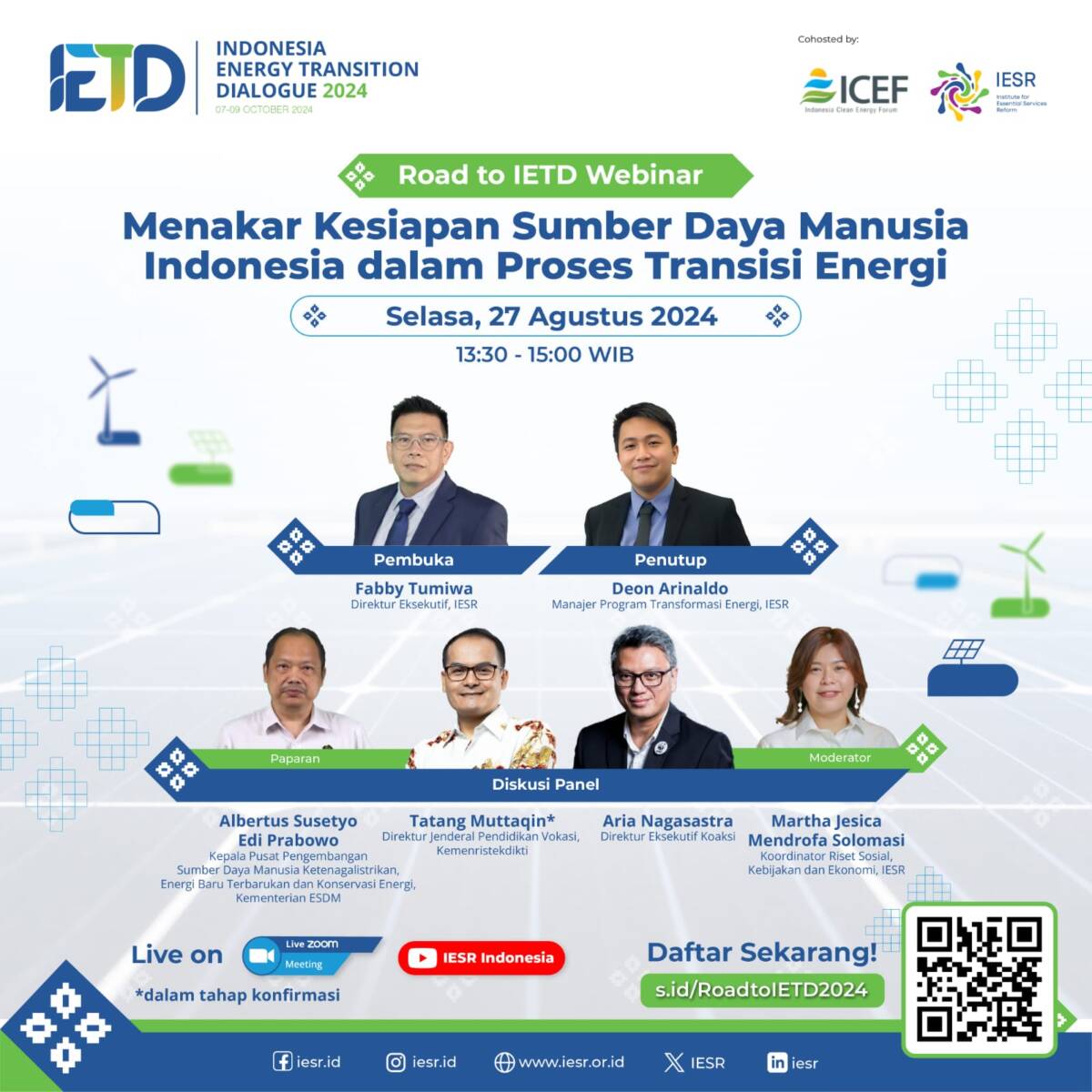
Road to IETD Webinar: Measuring the Readiness of Indonesia’s Human Resources in the Energy Transition Process
Background
Indonesia has committed to achieving Net Zero Emission in 2060 or earlier. The commitment is outlined in the Enhanced Nationally Determined Contribution where the achievement of national greenhouse gas emission reduction is targeted to decrease by 31.89% without international assistance and 43.2% with international assistance. However, Indonesia’s ENDC is still far from the emission reduction needed to limit the global average temperature rise below 1.5 C.
Indonesia’s renewable energy potential is abundant. From MEMR data, the technical potential (in terms of technical feasibility and land availability) reaches 3686 GW, of which the largest potential of solar power plant reaches 3295 GW, followed by wind power plant (onshore) 155 GW, hydroelectric power plant 95 GW, biomass power plant 57 GW, hydroelectric power plant 60 GW and geothermal power plant 24 GW. By utilizing the abundant potential, and the downward trend in renewable energy development costs, the acceleration of renewable energy needs to be prioritized as one of the pillars of sustainable economic development in Indonesia that can create new employment opportunities.
A study by the Koaksi Indonesia Foundation estimates that the renewable energy sector has the potential to create direct employment for up to 1.12 million technical workers by 2050. Meanwhile, in a broader scope, the Ministry of National Development Planning/Bappenas states that the principle of green economy development will create 4.4 million jobs by 2030. For this reason, the readiness of the energy transition in Indonesia needs to be supported by qualified human resources where the human resources needed are human resources who have skills, knowledge and experience both related to engineering and non-technical.
Looking at Indonesia’s Human Development Index data from global data, Indonesia is ranked 4th in Southeast Asia with a value of 0.713, lower than neighboring countries such as Singapore, Malaysia, Brunei Darussalam. Even Indonesia’s Human Development Index is still below the global average of 0.793. In the distribution of Indonesia’s education level in March 2023, only 10.15% of the population aged 15 years and over had tertiary level education, while this figure was almost equal to the number of people who did not graduate from elementary school at 9.01%. The issue of energy transition is complex because it is related to technological development and public perception and climate mitigation, so improving the quality of human resources through the education sector needs to be pursued.
In 2022, the Directorate General of Vocational Education of the Ministry of Education, Culture, Research & Technology, has signed a collaboration with the Swiss government to support the development of the Diploma 4 Renewable Energy Specialization program in Solar, Hydro and Hybrid by providing assistance in curriculum development and training modules, capacity building of lecturers and educational laboratory administrators, provision of educational facilities and infrastructure, internship programs, and partnerships with the world of business and industry (DUDI). Surely the skilled undergraduate education program in the field of renewable energy can be one of the breakthroughs in creating educated and trained workers who will go directly to the world of renewable energy work and teaching staff in vocational schools.
Objective:
- Identify opportunities and challenges for Indonesian workforce preparation in economic transformation towards a sustainable economy.
- Identify the role and collaboration of the government and other stakeholders in reskilling and upskilling human resources to meet the projected needs of green jobs.
- To promote a series of IETD 2024 activities
Presentation
Kementerian ESDM Strategy for Capacity Building of Skilled Personnel in Renewable Energy and Energy Conservation – Ahmad Khulaemi KESDM
Strategi-kementerian-ESDM-untuk-peningkatan-kapasitas-tenaga-terampil-dalam-energi-terbarukan-dan-konservasi-energi-Ahmad-Khulaemi-KESDMSpeakers
-
Fabby Tumiwa - Chief Executive Officer (CEO) - IESR
-
Deon Arinaldo - Manajer Program System Energy Transformation IESR
-
Albertus Susetyo Edi Prabowo - Head of Human Resources Development Center for Electricity New Renewable Energy and Energy Conservation - Kementerian ESDM
-
Dr. Ir. Kiki Yuliati M.Sc - Director General of Vocational Education - Kementerian Dikti
-
Aria Nagasastra - Executive Director Koaksi

